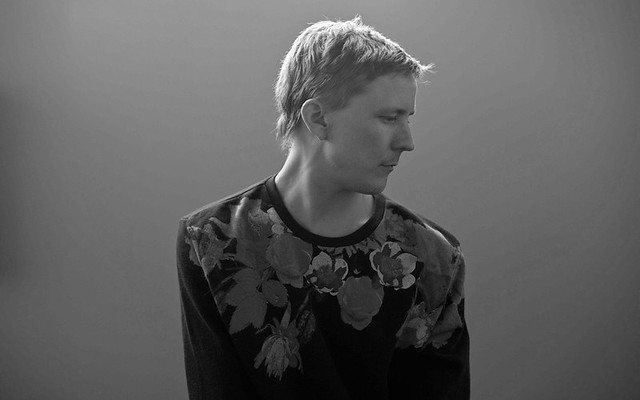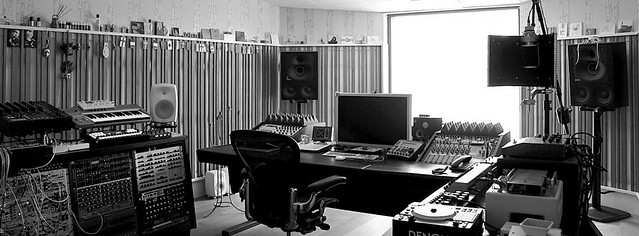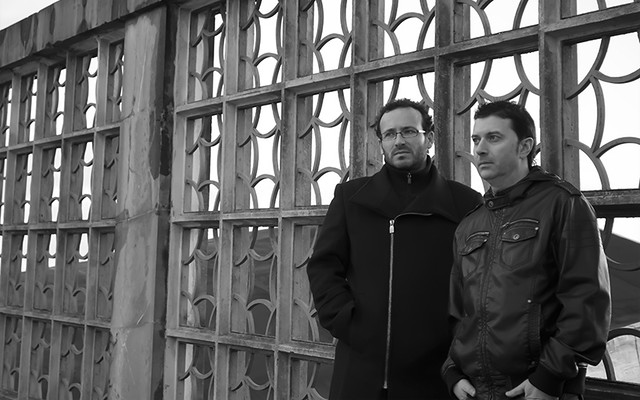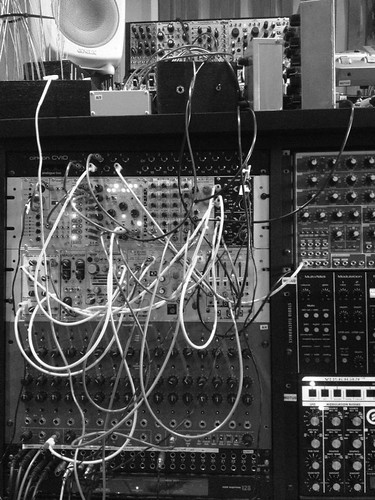Shine In Isolation // Vladislav Delay

Few artists manage to dodge classification quite so successfully as Sasu Ripatti. Over his lengthy career the Finnish producer has taken many approaches, from the punchy, jazz-imbued House of Lluomo, to the glitchy dub-infused offerings of his Sistol alias not too mention his work as Vladislav Delay, existing right on the fringe of what might be considered Ambient music.
Having relocated back to Finland in the last few years to build his new home and studio, Ripatti has also discovered a new musical residence for himself in his recently established vinyl-only imprint entitled simply ‘Ripatti’.
With the second release on the label inbound in the form of a ‘Heisenberg’ 12” (Ripatti’s collaboration with Max Lodenbauer) we thought it would be fitting to catch with him to discuss the new imprint, his ‘Shark Reef’ studio and weigh up the benefits & drawbacks of formal musical training.
So first off, what was it that prompted you to start the The Ripatti label? I’ve read that you’ve had problems working with external labels - given this, do you think this imprint will become the home for most of your future output?
First of all, I think you’ll have problems with and without other labels as long as you’re in the music business… but the main thing is that while there’s no money to be made with records I at least want to have as great products out as possible and have as good a time doing it as possible.
I hope the new label will become the main output channel for my music for a long time and that I can create a nice catalogue of various work, but I’ve seen things change drastically in cycles and surely more changes will come. I already once started a label after releasing on other labels and it made sense back then, then at some point I saw no reason to run my own label anymore and started releasing elsewhere instead, until recently again I really wanted to start my own channel.
Besides the industry things etc. it also relates to what one wants and how much capacities one has and all that. Recently I seem to like the idea of taking over control and avoid various compromises and executing my own vision.
In terms of the musical side of the Ripatti project, you are (at least in part) working with faster tempos that you perhaps have previously. Have you been listening to more footwork/D&B lately, or was this something you just decided to experiment with?
I haven’t listened to much of that new fast stuff, partly consciously to not be aware of what and how people make stuff, but also there’s lots of stuff I didn’t relate to. It might need a different medium, I can imagine that music working well in clubs with a good DJ. Some of the Chicago guys are doing nice stuff from what I’ve heard, but I must admit I like more the attitude and the concept than how it actually sounds.
From my side the past few years I have been getting quite bored of ambient and slow stuff, but equally of 4/4 grooves and have been slowly drifting to more fast tempos and going for rhythmic variations.
I enjoy doing stuff for the first time and experimenting with new things; this is what’s been going on, with faster tempos many things work differently. i also like the hectic feeling and intensity fast tempos generate.
I’ve also always liked 2-step a lot, not that I’ve been listening to it actively but it’s probably my favourite dance music. I also listened and actually produced some Drum & Bass in the late 90s, so that style is not totally alien to me, it’s just that I never released any of that stuff early on and kept away from it for a long time.
Is there a reason behind the use your real name for this latest enterprise, opposed to adopting another pseudonym?
Nothing particular. I didn’t want to release the Ripatti stuff under existing names and didn’t feel like creating another name. I also like the duality of label and project name.
Can you tell us a little bit about the studio you have built for yourself? How long had you been planning the new home and how does it feel having lived there for a while?
Studio… that’s a book if we start talking about it… I see it as an instrument in itself, with whatever is there. But it’s more than just bits and pieces of gear, it’s how they work together and how it all sounds and functions, can you play the studio and how well. Can you stay there for hours and feel afresh, stay inspired, can you trust the monitors and what you’re hearing and doing after a long day, is the sound tiring or not, is there oxygen, is there a view from outside and what kind. All these things matter greatly much more than what gear there is. Pretty much all gear is useless unless you can hear what you’re doing and also no gear helps in the end if you’re not inspired. Sometimes I also feel, listening to music being made today, is that all the gear begins to sound the same in the end, no matter what exclusive fancy gear is being used.

Anyway, while living in Berlin I started seriously thinking about building a studio somewhere, preferably from scratch so to be able to design as good acoustic environment as possible, to avoid compromises you always have to deal with when moving to an existing space and trying to make that sound good. We were looking for a place to move, to live and work, which took several years and when we found the island and a property we started the project. First it took quite some time to get acoustic planning from one highly regarded guy in Helsinki and have it all “look and seem fine”. Then it took about two years to get everything roughly together and then I spent about a year more to put the studio together properly with wiring and everything, getting the sound together and so on.
Having done it all it’s really quite remarkable. It’s so much work and financial pressure and so on, I will pay for it for the rest of my life but then again it’s something I really wanted to create, my own place somewhere where I feel comfortable living and being creative, not having a landlord and all such stuff around, neighbours etc.
What is the island like in general? Having lived in Berlin do you find it nice to be in an environment not so saturated with other musicians and producers?
It’s ideal for me. It’s really quite isolated and remote but then again it is accessible relatively easily, considering how wild and isolated the spot you actually are in.
It’s for the large part a nature reserve for wildlife, mainly migrating birds. It’s the biggest island in Finland, it’s rather spacious. There’s enough people to have some kind of community, and the basic needs are covered. I think it’s beautiful as anything, I very much enjoy living there.
For me it’s not really possible to compare Berlin and Hailuoto, one is what I want and like and was craving for, and the other was what I wanted to get away from. I never went to Berlin for the scene and all this stuff it’s famous for, my now-wife was living there back then and we wanted to move together and the other option was Helsinki which I was getting very bored of at that time.
I create and shine in isolation. I need my space, I don’t need interaction or interruption or hassle or trendy stuff and so forth around me when I create but the opposite. I do interact and socialise when traveling, I get to do the city things during travels and I get input from various sources but when I work most of it just becomes a disturbance.
One of your other projects is working as part of the Moritz Von Oswald Trio. How did you first hook up with Moritz Van Oswald & Max Loderbauer, and is the project harder to keep up with these days given your relocation to Finland?
I actually stopped the project from my side some months ago. For me it has come time to do other stuff, time is so limited. I’ve known Moritz since 15 years ago and it was his idea to try a band setting and he brought Max in as well and that’s how I got to know Max.
I worked with the group for five years while living in Finland, most of the group’s active period so I don’t think the location played such a role. Of course if everyone lived in Berlin you could rehearse or hang out more but I’m not sure if that’s always to the benefit of music.
**There is an audiovisual installation from yourself and Vito Acconci, at the Kiasma museum of contemporary art currently, can you tell us a little bit about how this came about, and what people can expect from the piece? **
The piece with Vito is actually a one-day thing taking place on November 16th. I also made three permanent sound pieces for the museum by myself.
But the Vito collaboration, that’s going to be interesting. I don’t know yet what will come out of it but the concept is to create a full-day performance-installation and do it in an open-source way where there’s really no beginning and end of an official piece, but instead we’ll begin building it up and at some point it’s rolling and then at some point we’ll gradually start taking it down, all these phases won’t be marked or presented with any cues etc. audience can be there and see us starting in the morning while we try to figure out the piece together. Of course there’s going to be preparation some days beforehand, it’s not all freestyle as it involves video and lights and of course audio in various ways.
I have always liked Vito and his work and we’ve known each other a little bit since years ago and wanted to do something together since a while but didn’t really find a suitable setting until now.
**Can you see yourself working more closely with visual artists in the future? **
I have no clear idea or rules what I want to do or what not. It really depends on the person and project and context. But surely I could imagine working with visual artists and collaborating as long as it’s something interesting. If it’s a new thing it is welcomed by itself, usually things and projects where you don’t know much work best, there’s no routine there’s no knowledge to base upon. Virginal territories.
Following the ‘week in the studio’ pictures on your Facebook has been pretty interesting - In total how many instruments do you own? Do you find it inspiring to use unconventional, and perhaps unfamiliar equipment?
I have collected some amount of instruments along the years but I’m not a collector. I only keep stuff I like the sound of and the feel of.
Overall I find unconventional and unfamiliar the things that work for me. If it’s not such a thing I’ll make it one, one way or another. I absolutely have no interest in conventional music or musical things, I have nothing to say in such a generic context, I get bored immediately, and the world is more than full of it already, sadly.
I try to challenge myself in various ways, and one is via sound, trying to find interesting sounds. and I really don’t care from where and how they come about. I don’t conceptualise or theorise, I just go for the results and follow instincts. Whatever works. But yes, I find real items, be it musical instrument or anything else, a great source of sound. when mic’d and processed the variety and range of sound is huge compared to analog or digital sound generation which is more limited no matter what blinking lights you have going on.
I also wanted to ask about your background as a classical percussionist, do you think there is an element of tension in the music you make with your formal training? You quite often work with unconventional rhythmic patterns.
It’s difficult to say. Part of me thinks training and learning, “supposed” things just makes for bad music. But then again, when I listen to most of the electronic music I feel there’s no musical thinking behind it but it’s just a sporty act or something funny or whatever, and it’d be good for the producer or artist to spend time listening other kind of music for a while and learn about whatever music form there is; just learn musical languages which is unfortunately based on lots of rules one should not take for granted. So I guess it’s about learning the rules and then learning to forget the rules.
I spent as much time unlearning and protesting against everything I learnt as I did learning all of it, which both is a lot. I don’t regret having learnt anything, I truly believe in knowledge and experience.
But also most of the unconventional rhythmic stuff, as you call it, started only coming about after I realised I had studied and learnt so much and it all meant nothing musically, it was just generic stuff no matter how deep into this or that niche I went into, that it was just a realisation that there’s a door to open if only I left all of the learnt stuff away. Of course it’s hard to forget what you have learnt but I’m trying to get that door still open, I know it’s there. Nowadays I think it’s not about trying to forget or ignore what you know and have learnt but not pay any attention to it and not letting it rule what you’re trying to do and achieve.
**Finally, the debut release from ‘Heisenberg’, your project with Max Lodenbauer is up next on the Ripatti imprint, what can people expect from the release? **
There’s already a short sample on Ripatti Label SoundCloud. Heisenberg stuff is pretty wild studio/gear exploration. It’s pretty fast tempo again… It’s mostly live jams in the studio we did when Max visited Hailuoto, and I’ve been producing/mixing it together afterwards. It’s quite unique and original considering how conventional stuff it’s based on. There’s often straight rhythmic stuff going on and it’s slowly evolving stuff but there’s something somewhat mad there I like.
There will be a range of music coming out on the label. 03 is a Vladislav Delay EP, rather experimental rhythmic stuff while 04 is a collaboration with a producer named Teeth, and those tracks are more club-like, at least in my book. Then again there’ll be more odd stuff as well.
- Published
- Oct 24, 2013
- Credits
- Words by Theo Darton-Moore

